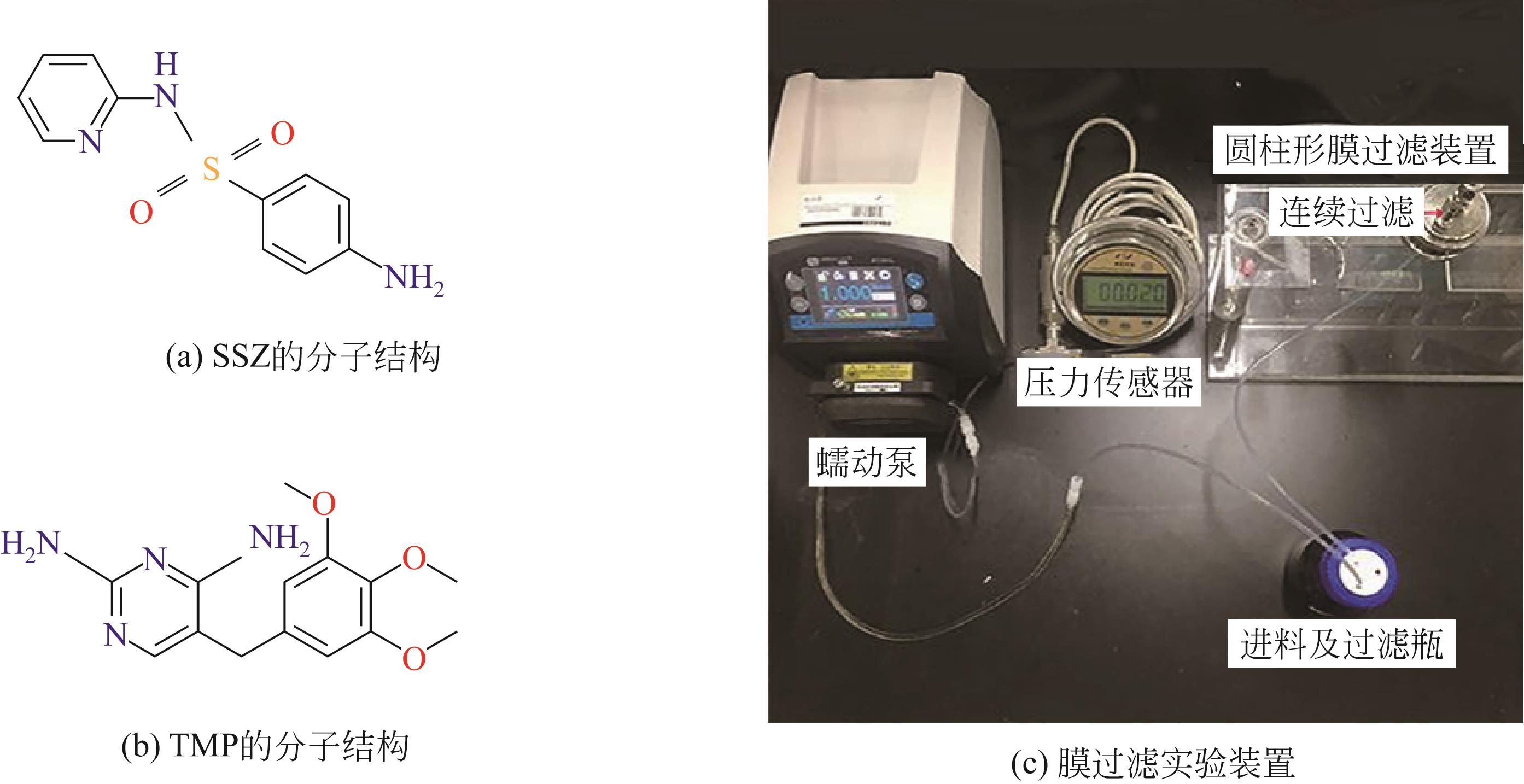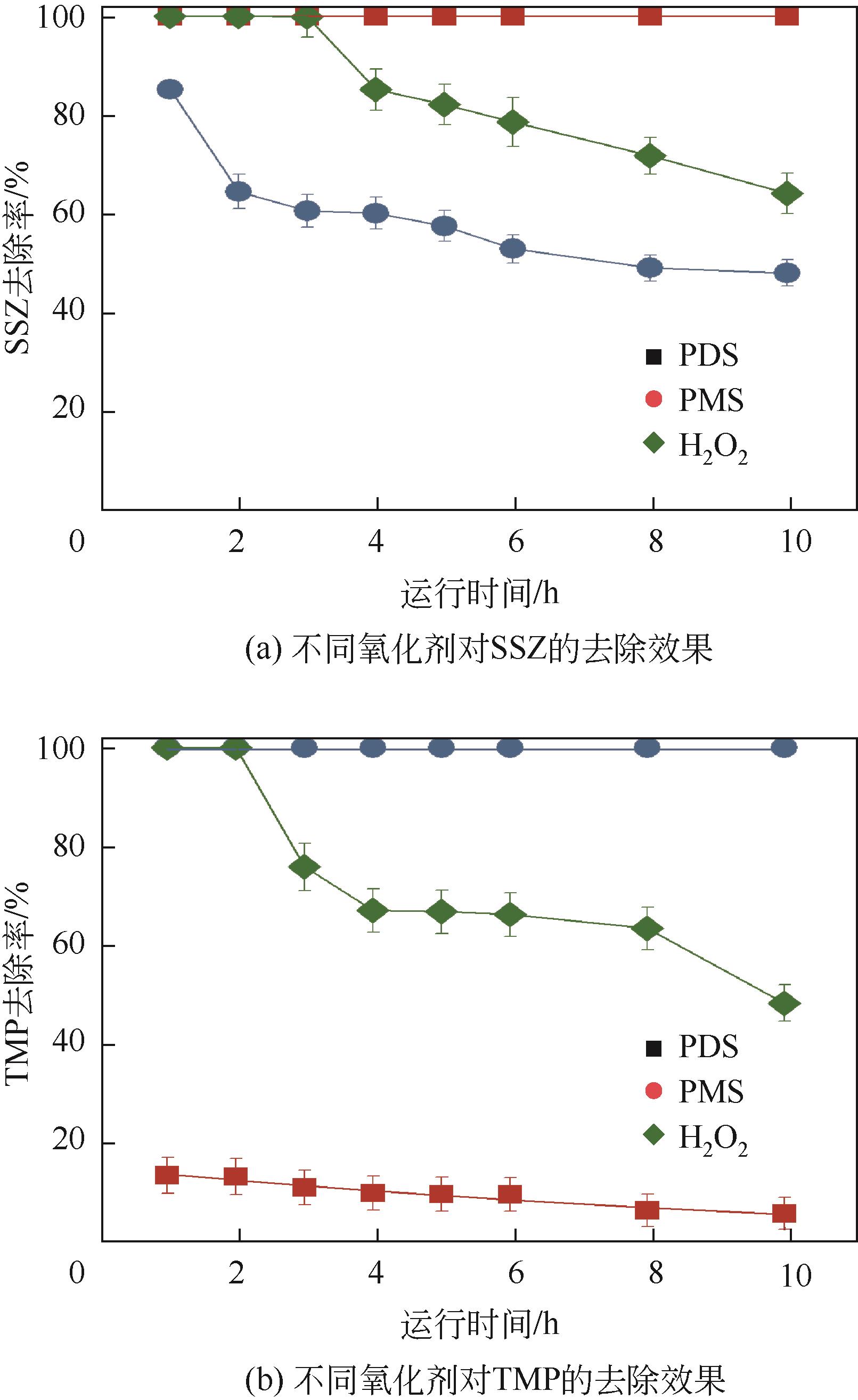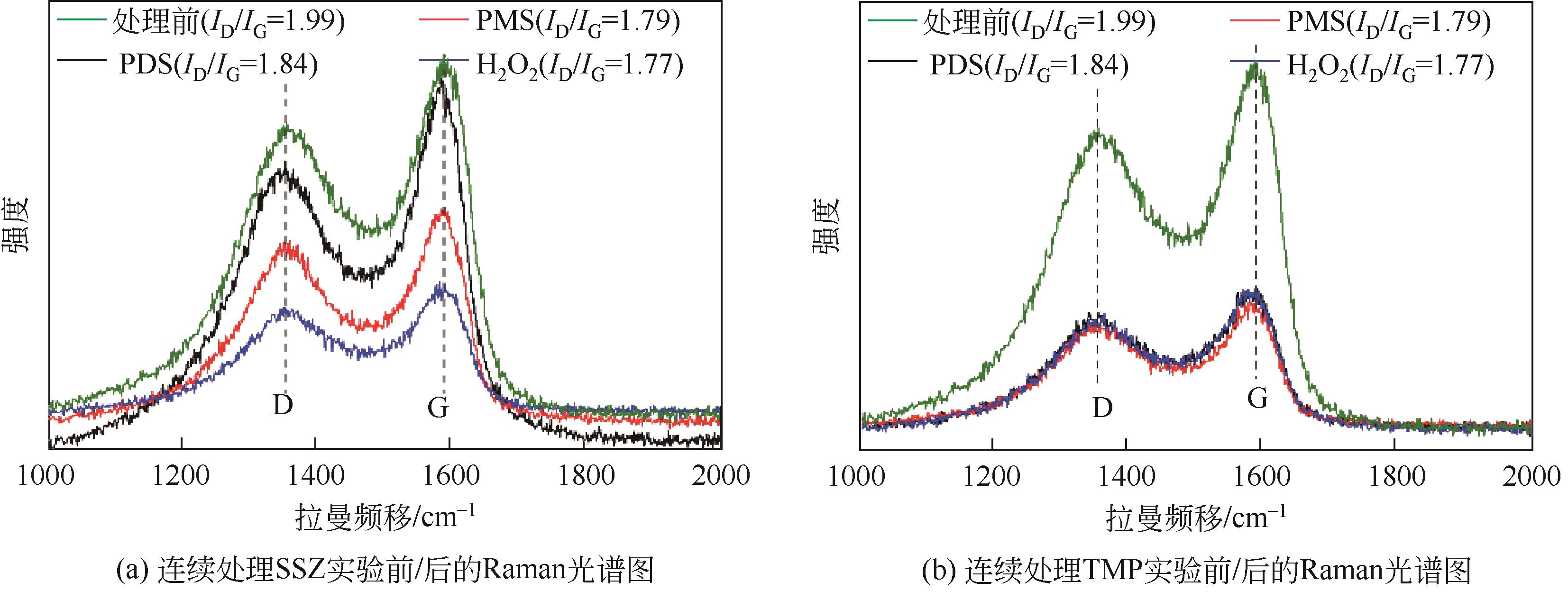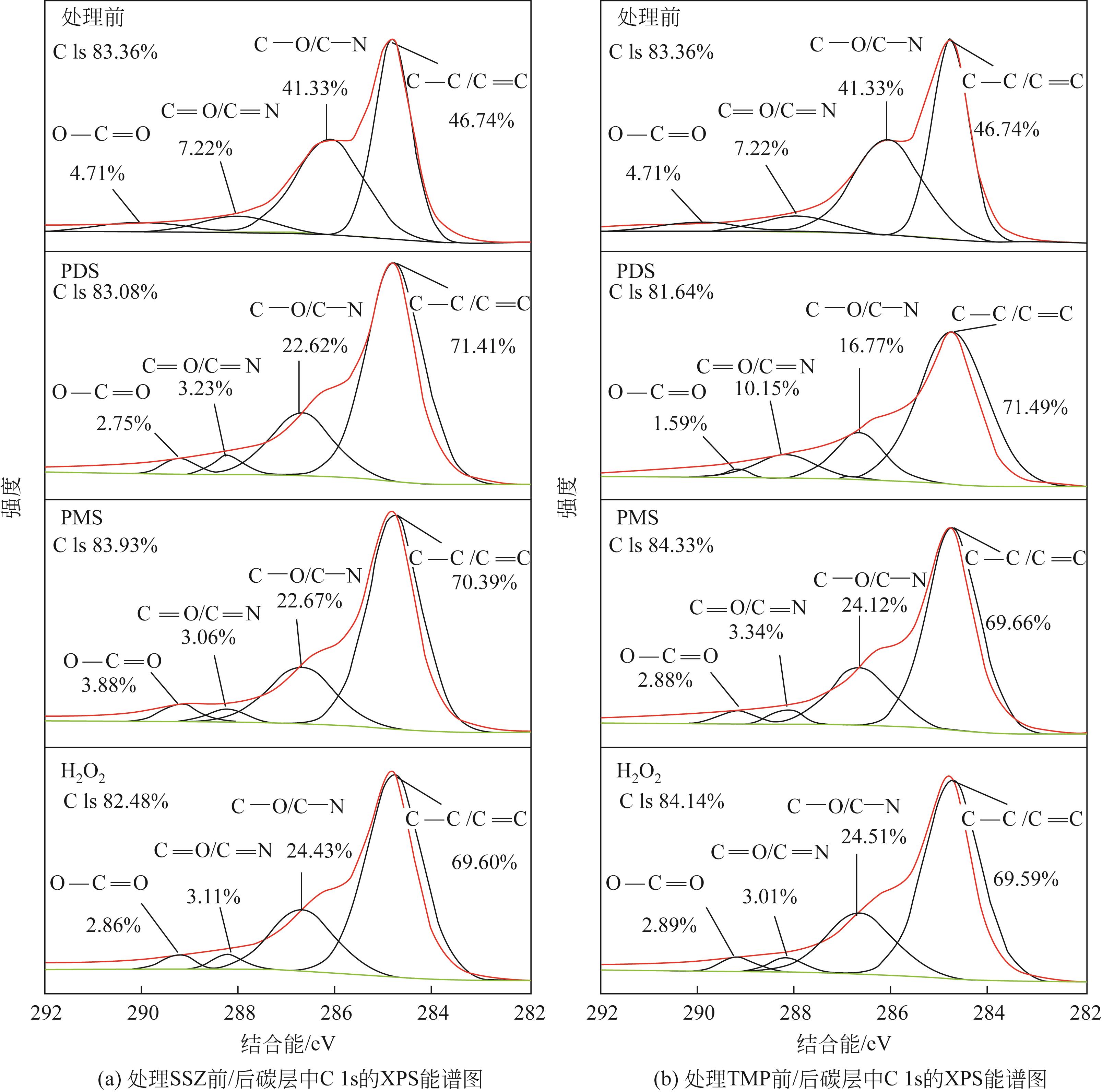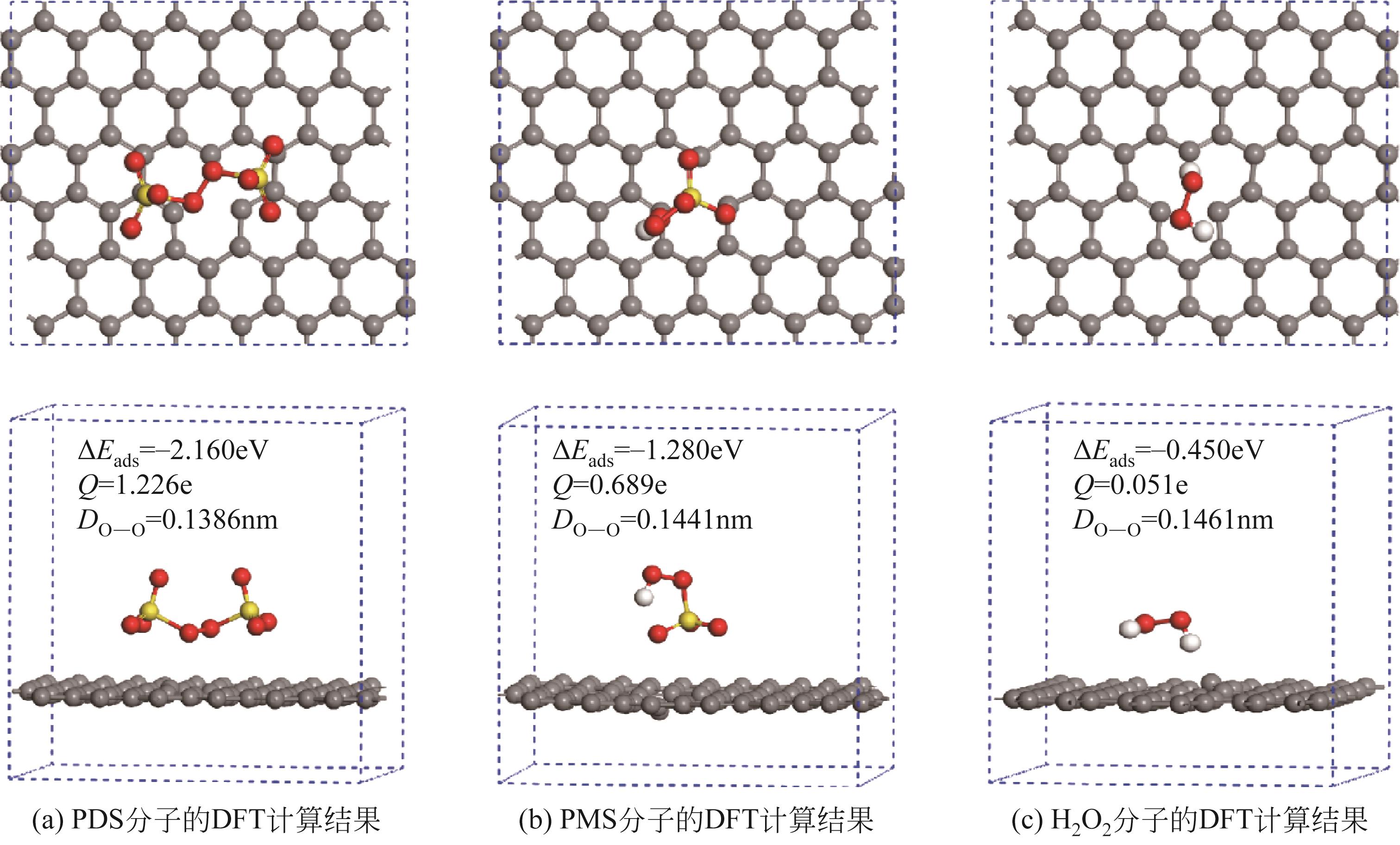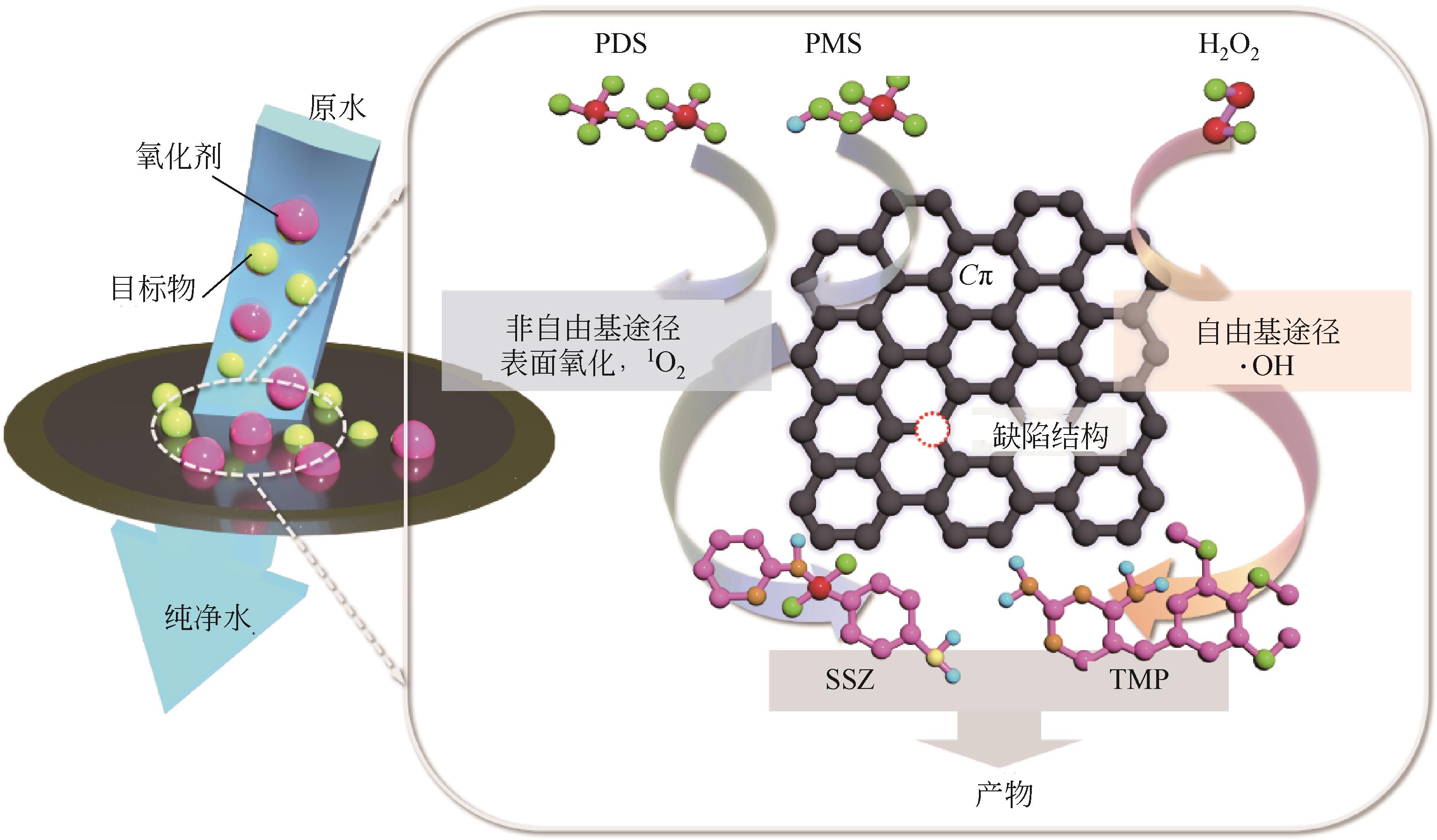化工进展 ›› 2024, Vol. 43 ›› Issue (3): 1436-1445.DOI: 10.16085/j.issn.1000-6613.2023-0494
• 材料科学与技术 • 上一篇
氧化剂类型对rGO/CNTs催化膜去除水中消炎药成分的影响
严昱1( ), 夏芯1, 骆俊鹏1, 刘大朋1,2, 钱飞跃1,2(
), 夏芯1, 骆俊鹏1, 刘大朋1,2, 钱飞跃1,2( )
)
- 1.苏州科技大学环境科学与工程学院,江苏 苏州 215009
2.城市生活污水资源化利用技术国家地方联合工程 实验室,江苏 苏州 215009
-
收稿日期:2023-03-30修回日期:2023-06-30出版日期:2024-03-10发布日期:2024-04-11 -
通讯作者:钱飞跃 -
作者简介:严昱(1999—),女,硕士研究生,研究方向为环境污染控制理论与技术。E-mail:iyanyu99@163.com。 -
基金资助:国家自然科学基金(51908394);江苏省研究生培养创新工程研究生科研与创新计划(SJCX22_1563,SJCX23_1715);苏州市重点产业技术创新项目(SYG202141);苏州市社会发展科技创新重点项目(2022SS10)
Effects of peroxide types on the removal of anti-inflammatory medicines in water with rGO/CNTs catalytic membranes
YAN Yu1( ), XIA Xin1, LUO Junpeng1, LIU Dapeng1,2, QIAN Feiyue1,2(
), XIA Xin1, LUO Junpeng1, LIU Dapeng1,2, QIAN Feiyue1,2( )
)
- 1.School of Environmental Science and Engineering, Suzhou University of Science and Technology, Suzhou 215009, Jiangsu, China
2.National and Local Joint Engineering Laboratory of Resource Utilization Technology of Municipal Sewage, Suzhou 215009, Jiangsu, China
-
Received:2023-03-30Revised:2023-06-30Online:2024-03-10Published:2024-04-11 -
Contact:QIAN Feiyue
摘要:
磺胺吡啶(SSZ)与甲氧苄啶(TMP)是常用的消炎药组合,其排入水体后可能引发生态风险。为实现污染物的高效净化,将还原氧化石墨烯和碳纳米管(rGO/CNTs)复合碳层负载于微滤膜表面,并通过活化多种氧化剂,建立了可实现连续处理的原位催化氧化体系。研究结果表明,过二硫酸盐(PDS)和过一硫酸盐(PMS)分别是rGO/CNTs催化膜去除水中SSZ和TMP的最佳氧化剂,而过氧化氢(H2O2)体系的除污效能随运行时间衰减较快。由活性氧组分淬灭实验、碳层表面基团表征和密度泛函理论计算可知,碳层缺陷结构是吸附、活化PDS和PMS分子,诱发表面氧化和单线态氧(1O2)等非自由基氧化的关键位点。与羟自由基(·OH)反应占主导的H2O2体系相比,PDS和PMS催化氧化具有明显的目标物选择性,能够更有效地抵抗水体背景物质的干扰和减缓膜污染的形成。上述发现对于进一步优化碳质催化膜的功能设计、推动原位催化氧化新技术发展具有指导意义。
中图分类号:
引用本文
严昱, 夏芯, 骆俊鹏, 刘大朋, 钱飞跃. 氧化剂类型对rGO/CNTs催化膜去除水中消炎药成分的影响[J]. 化工进展, 2024, 43(3): 1436-1445.
YAN Yu, XIA Xin, LUO Junpeng, LIU Dapeng, QIAN Feiyue. Effects of peroxide types on the removal of anti-inflammatory medicines in water with rGO/CNTs catalytic membranes[J]. Chemical Industry and Engineering Progress, 2024, 43(3): 1436-1445.
| 水样 | DOC①/mg·L-1 | SUVA② | Cl-/mg·L-1 | HCO | pH |
|---|---|---|---|---|---|
| DW | 0.16±0.07 | 0.107 | 未检出 | 未检出 | 7.00±0.03 |
| TW | 3.24±0.23 | 0.463 | 7.02±0.61 | 13.41±1.27 | 7.02±0.10 |
| SW | 7.12±0.57 | 0.913 | 5.48±1.67 | 15.33±2.05 | 8.39±0.14 |
表1 不同水样的水质情况
| 水样 | DOC①/mg·L-1 | SUVA② | Cl-/mg·L-1 | HCO | pH |
|---|---|---|---|---|---|
| DW | 0.16±0.07 | 0.107 | 未检出 | 未检出 | 7.00±0.03 |
| TW | 3.24±0.23 | 0.463 | 7.02±0.61 | 13.41±1.27 | 7.02±0.10 |
| SW | 7.12±0.57 | 0.913 | 5.48±1.67 | 15.33±2.05 | 8.39±0.14 |
| 1 | LU Ping, FANG Yao, BARVOR J, et al. Review of antibiotic pollution in the Seven Watersheds in China[J]. Polish Journal of Environmental Studies, 2019, 28(6): 4045-4055. |
| 2 | HUANG Fuyang, CHEN Linpeng, ZHANG Chong, et al. Prioritization of antibiotic contaminants in China based on decennial national screening data and their persistence, bioaccumulation and toxicity[J]. Science of the Total Environment, 2022, 806: 150636. |
| 3 | 鲁京慧, 吴丽娟. 联磺甲氧苄啶治疗耐碳青霉烯肺炎克雷伯杆菌血流感染1例[J]. 中国医药科学, 2016, 6(14): 226-228. |
| LU Jinghui, WU Lijuan. A Case: Sulfamethoxazole, sulfadiazine and trimethoprim tablets treatment carbapenem-resistant Klebsiella pneumoniae bloodstream infection[J]. China Medicine and Pharmacy, 2016, 6(14): 226-228. | |
| 4 | CHRISTOU A, KARAOLIA P, HAPESHI E, et al. Long-term wastewater irrigation of vegetables in real agricultural systems: Concentration of pharmaceuticals in soil, uptake and bioaccumulation in tomato fruits and human health risk assessment[J]. Water Research, 2017, 109: 24-34. |
| 5 | ZHENG Wentian, LIU Yanbiao, LIU Wen, et al. A novel electrocatalytic filtration system with carbon nanotube supported nanoscale zerovalent copper toward ultrafast oxidation of organic pollutants[J]. Water Research, 2021, 194: 116961. |
| 6 | SUN Xianbo, HE Weiyu, YANG Tao, et al. Ternary TiO2/WO3/CQDs nanocomposites for enhanced photocatalytic mineralization of aqueous cephalexin: Degradation mechanism and toxicity evaluation[J]. Chemical Engineering Journal, 2021, 412: 128679. |
| 7 | YU Jiangfang, FENG Haopeng, TANG Lin, et al. Metal-free carbon materials for persulfate-based advanced oxidation process: Microstructure, property and tailoring[J]. Progress in Materials Science, 2020, 111: 100654. |
| 8 | CHEN Xiao, Wen-Da OH, Teik-Thye LIM. Graphene- and CNTs-based carbocatalysts in persulfates activation: Material design and catalytic mechanisms[J]. Chemical Engineering Journal, 2018, 354: 941-976. |
| 9 | XIA Xin, LUO Junpeng, LIU Dapeng, et al. Metal-free graphene-based catalytic membranes for persulfate activation toward organic pollutant removal: A review[J]. Environmental Science and Pollution Research International, 2022, 29(50): 75184-75202. |
| 10 | PEDROSA M, DRAZIC G, TAVARES P B, et al. Metal-free graphene-based catalytic membrane for degradation of organic contaminants by persulfate activation[J]. Chemical Engineering Journal, 2019, 369: 223-232. |
| 11 | CHEN Xianfu, QIU Minghui, DING Hao, et al. A reduced graphene oxide nanofiltration membrane intercalated by well-dispersed carbon nanotubes for drinking water purification[J]. Nanoscale, 2016, 8(10): 5696-5705. |
| 12 | HUANG Huimin, SHENG Jiayi, QIAN Feiyue, et al. Effects of graphene oxide incorporation on the mat structure and performance of carbon nanotube composite membranes[J]. Research on Chemical Intermediates, 2019, 45(2): 533-548. |
| 13 | LUO Junpeng, LIU Tingting, QIAN Feiyue, et al. Boosting non-radical oxidation in peroxydisulfate activation with carbonaceous catalytic membranes by coupling structural defects and nitrogen doping sites[J]. Journal of Environmental Chemical Engineering, 2022, 10(3): 108101. |
| 14 | LIU Yatao, LIN Quan, GUO Yuanqing, et al. The nitrogen-doped multi-walled carbon nanotubes modified membrane activated peroxymonosulfate for enhanced degradation of organics and membrane fouling mitigation in natural waters treatment[J]. Water Research, 2022, 209: 117960. |
| 15 | LIU Yanbiao, YU Ling, CHOON Ong Nam, et al. Nitrogen-doped graphene nanosheets as reactive water purification membranes[J]. Nano Research, 2016, 9(7): 1983-1993. |
| 16 | CRUZ-ALCALDE A, LÓPEZ-VINENT N, RIBEIRO R S, et al. Persulfate activation by reduced graphene oxide membranes: Practical and mechanistic insights concerning organic pollutants abatement[J]. Chemical Engineering Journal, 2022, 427: 130994. |
| 17 | 郭朋举, 何小波, 银凤翔. 电催化氮还原合成氨MOF基催化剂研究进展[J]. 化工进展, 2023, 42(4): 1797-1810. |
| GUO Pengju, HE Xiaobo, YIN Fengxiang. Research progress in MOF-based catalysts for electrocatalytic nitrogen reduction to ammonia[J]. Chemical Industry and Engineering Progress, 2023, 42(4): 1797-1810. | |
| 18 | KRESSE G, HAFNER J. Ab initio molecular dynamics for liquid metals[J]. Physical Review B, Condensed Matter, 1993, 47(1): 558-561. |
| 19 | SHENG Jiayi, YIN Honggui, QIAN Feiyue, et al. Reduced graphene oxide-based composite membranes for in-situ catalytic oxidation of sulfamethoxazole operated in membrane filtration[J]. Separation and Purification Technology, 2020, 236: 116275. |
| 20 | 陈卫, 袁哲, 陶辉, 等. SUVA值与超滤膜污染的关系[J]. 华中科技大学学报(自然科学版), 2011, 39(2): 129-132. |
| CHEN Wei, YUAN Zhe, TAO Hui, et al. Relationship between SUVA value and ultrafiltration pollution[J]. Journal of Huazhong University of Science and Technology (Natural Science Edition), 2011, 39(2): 129-132. | |
| 21 | LIU Haoyu, LIU Yani, TANG Lin, et al. Egg shell biochar-based green catalysts for the removal of organic pollutants by activating persulfate[J]. Science of the Total Environment, 2020, 745: 141095. |
| 22 | QIAN Feiyue, LUO Junpeng, YIN Honggui, et al. Carbonaceous composite membranes for peroxydisulfate activation to remove sulfamethoxazole in a real water matrix[J]. Chemosphere, 2022, 288: 132597. |
| 23 | QIAN Feiyue, YIN Honggui, LIU Feng, et al. The in situ catalytic oxidation of sulfamethoxazole via peroxydisufate activation operated in a NG/rGO/CNTs composite membrane filtration[J]. Environmental Science and Pollution Research, 2021, 28(21): 26828-26839. |
| 24 | GAO Shiqian, GUO Yutong, LI Xinyue, et al. Magnetic solid phase extraction of sulfonamides based on carboxylated magnetic graphene oxide nanoparticles in environmental waters[J]. Journal of Chromatography A, 2018, 1575: 1-10. |
| 25 | 魏丽娟, 任庆贤, 宁春欢. 系数倍率双波长紫外分光光度法测定复方磺胺对甲氧嘧啶钠注射液中TMP的含量[J]. 中国兽药杂志, 2002, 36(11): 30-31. |
| WEI Lijuan, REN Qingxian, NING Chunhuan. Determination of TMP in compound sulfamonomethoxine sodium injection by dual-wavelength ultraviolet spectrophotometry with coefficient ratio[J]. Chinese Journal of Veterinary Drug, 2002, 36(11): 30-31. | |
| 26 | PERDEW J P, BURKE K, ERNZERHOF M. Generalized gradient approximation made simple[J]. Physical Review Letters, 1996, 77(18): 3865-3868. |
| 27 | XIE Zhihui, HE Chuanshu, ZHOU Hongyu, et al. Effects of molecular structure on organic contaminants’ degradation efficiency and dominant ROS in the advanced oxidation process with multiple ROS[J]. Environmental Science & Technology, 2022, 56(12): 8784-8795. |
| 28 | 孙建平, 缪应蒙, 曹相春. 基于密度泛函理论研究掺杂Pd石墨烯吸附O2及CO[J]. 物理学报, 2013, 62(3): 265-272. |
| SUN Jianping, MIAO Yingmeng, CAO Xiangchun. Density functional theory studies of O2 and CO adsorption on the graphene doped with Pd[J]. Acta Physica Sinica, 2013, 62(3): 265-272. | |
| 29 | LEE Jaesang, VON GUNTEN Urs, KIM Jae-Hong. Persulfate-based advanced oxidation: Critical assessment of opportunities and roadblocks[J]. Environmental Science & Technology, 2020, 54(6): 3064-3081. |
| 30 | SU Pei, ZHOU Minghua, LU Xiaoye, et al. Electrochemical catalytic mechanism of N-doped graphene for enhanced H2O2 yield and in situ degradation of organic pollutant[J]. Applied Catalysis B: Environmental, 2019, 245: 583-595. |
| 31 | GONG Bo, KU Calvin, YU Hanqing, et al. Predicting the mechanisms for H2O2 activation and phenol oxidation catalyzed by modified graphene-based systems using density functional theory[J]. ACS Applied Materials & Interfaces, 2022, 14(31): 35682-35693. |
| 32 | WANG Xiaobo, QIN Yanlei, ZHU Lihua, et al. Nitrogen-doped reduced graphene oxide as a bifunctional material for removing bisphenols: Synergistic effect between adsorption and catalysis[J]. Environmental Science & Technology, 2015, 49(11): 6855-6864. |
| 33 | REN Wei, CHENG Cheng, SHAO Penghui, et al. Origins of electron-transfer regime in persulfate-based nonradical oxidation processes[J]. Environmental Science & Technology, 2022, 56(1): 78-97. |
| 34 | YANG Hailan, YE Shujing, WANG Han, et al. Insight into disinfection byproduct formation potential of aged biochar and its effects during chlorination[J]. Journal of Environmental Management, 2022, 317: 115437. |
| 35 | ZENG Huiping, LI Jianxue, XU Jiaxin, et al. Magnetic biochar based on platanus leaves and iron sludge for persulfate activation and catalytic degradation of tetracycline[J]. Journal of Cleaner Production, 2022, 370: 133336. |
| 36 | ADIL S, KIM Woong Sub, KIM Tae Hyeong, et al. Defective, oxygen-functionalized multi-walled carbon nanotubes as an efficient peroxymonosulfate activator for degradation of organic pollutants[J]. Journal of Hazardous Materials, 2020, 396: 122757. |
| 37 | LI Oi Lun, PRABAKAR K, KANEKO A, et al. Exploration of Lewis basicity and oxygen reduction reaction activity in plasma-tailored nitrogen-doped carbon electrocatalysts[J]. Catalysis Today, 2019, 337: 102-109. |
| 38 | YANG Shengjiong, XU Shengshuo, TONG Jiayao, et al. Overlooked role of nitrogen dopant in carbon catalysts for peroxymonosulfate activation: Intrinsic defects or extrinsic defects?[J]. Applied Catalysis B: Environmental, 2021, 295: 120291. |
| 39 | CHEN Hao, CARROLL K C. Metal-free catalysis of persulfate activation and organic-pollutant degradation by nitrogen-doped graphene and aminated graphene[J]. Environmental Pollution, 2016, 215: 96-102. |
| 40 | TANG Lin, LIU Yani, WANG Jiajia, et al. Enhanced activation process of persulfate by mesoporous carbon for degradation of aqueous organic pollutants: Electron transfer mechanism[J]. Applied Catalysis B: Environmental, 2018, 231: 1-10. |
| 41 | LI Hao, LIU Yi, JIANG Feng, et al. Persulfate adsorption and activation by carbon structure defects provided new insights into ofloxacin degradation by biochar[J]. Science of the Total Environment, 2022, 806: 150968. |
| 42 | PENG Jiali, ZHOU Peng, ZHOU Hongyu, et al. Insights into the electron-transfer mechanism of permanganate activation by graphite for enhanced oxidation of sulfamethoxazole[J]. Environmental Science & Technology, 2021, 55(13): 9189-9198. |
| 43 | ZHANG Wen, LI Yang, FAN Xiaobin, et al. Synergy of nitrogen doping and structural defects on hierarchically porous carbons toward catalytic oxidation via a non-radical pathway[J]. Carbon, 2019, 155: 268-278. |
| 44 | DUAN Xiaoguang, AO Zhimin, SUN Hongqi, et al. Insights into N-doping in single-walled carbon nanotubes for enhanced activation of superoxides: A mechanistic study[J]. Chemical Communications, 2015, 51(83): 15249-15252. |
| 45 | NIE Chunyang, DAI Zhenhua, LIU Wenjie, et al. Criteria of active sites in nonradical persulfate activation process from integrated experimental and theoretical investigations: Boron-nitrogen-co-doped nanocarbon-mediated peroxydisulfate activation as an example[J]. Environmental Science: Nano, 2020, 7(7): 1899-1911. |
| 46 | DUAN Xiaoguang, AO Zhimin, ZHOU Li, et al. Occurrence of radical and nonradical pathways from carbocatalysts for aqueous and nonaqueous catalytic oxidation[J]. Applied Catalysis B: Environmental, 2016, 188: 98-105. |
| 47 | REN Wei, NIE Gang, ZHOU Peng, et al. The intrinsic nature of persulfate activation and N-doping in carbocatalysis[J]. Environmental Science & Technology, 2020, 54(10): 6438-6447. |
| [1] | 刘方旺, 韩艺, 张佳佳, 步红红, 王兴鹏, 于传峰, 刘猛帅. CO2与环氧化物耦合制备环状碳酸酯的多相催化体系研究进展[J]. 化工进展, 2024, 43(3): 1252-1265. |
| [2] | 张鹏飞, 严张艳, 任亮, 张奎, 梁家林, 赵广乐, 张璠玢, 胡志海. C |
| [3] | 谷星朋, 马红钦, 刘嘉豪. 雷尼镍的磷量子点改性及其催化加氢脱硫性能[J]. 化工进展, 2024, 43(3): 1293-1301. |
| [4] | 张书铭, 刘化章. 基于BP神经网络模型优化Fe1-x O基氨合成催化剂[J]. 化工进展, 2024, 43(3): 1302-1308. |
| [5] | 萧垚鑫, 张军, 单锐, 袁浩然, 陈勇. Pt/CaO材料催化糠醇加氢制备戊二醇[J]. 化工进展, 2024, 43(3): 1318-1327. |
| [6] | 李开瑞, 高照华, 刘甜甜, 李静, 魏海生. 还原温度调变Rh/FePO4催化剂喹啉选择加氢性能[J]. 化工进展, 2024, 43(3): 1342-1349. |
| [7] | 赵国珂, 张杨, 刘轶群. 膜法分离一/二价阳离子的研究进展[J]. 化工进展, 2024, 43(3): 1363-1373. |
| [8] | 徐泽文, 王明, 王强, 侯影飞. 胺基材料在二氧化碳分离膜领域研究进展[J]. 化工进展, 2024, 43(3): 1374-1386. |
| [9] | 刘斌, 王勇军, 吕汪洋, 陈文兴. 高稳定性钛系聚酯催化剂TiOC@SiO2的制备及应用[J]. 化工进展, 2024, 43(3): 1395-1402. |
| [10] | 王璧琮, 潘大伟, 谢锐, 巨晓洁, 刘壮, 汪伟, 褚良银. 复合酶@ZIF-8的制备及其黑米花青素提取性能[J]. 化工进展, 2024, 43(3): 1403-1411. |
| [11] | 王雄, 康文倩, 任悦, 乔彤森, 张鹏, 黄安平, 李广全. 多孔有机聚合物中试制备及其在聚烯烃催化剂中的应用[J]. 化工进展, 2024, 43(3): 1412-1417. |
| [12] | 林明杰, 李士洋, 马俊梅, 高从堦, 薛立新. 聚酰胺/醋酸纤维素复合正渗透膜的制备及相转化工艺参数的优化[J]. 化工进展, 2024, 43(3): 1418-1427. |
| [13] | 钱俊明, 郭猛, 任秀秀, 余亮, 钟璟, 徐荣. 芳烃官能化有机硅膜的制备及丙烯/丙烷分离性能[J]. 化工进展, 2024, 43(3): 1428-1435. |
| [14] | 王岩森, 侯丹丹, 李长金, 祁丽亚, 王春堯, 郭敏, 王颖. 氧化石墨烯/聚丙烯酸基导电黏附凝胶的制备与性能[J]. 化工进展, 2024, 43(2): 1022-1032. |
| [15] | 姚福春, 毕莹莹, 唐晨, 杜明辉, 李泽莹, 张耀宗, 孙晓明. 中空纤维膜臭氧接触式反应器传质机理分析[J]. 化工进展, 2024, 43(2): 1089-1097. |
| 阅读次数 | ||||||
|
全文 |
|
|||||
|
摘要 |
|
|||||
